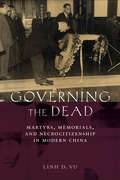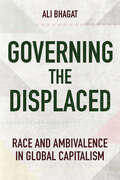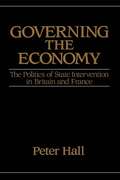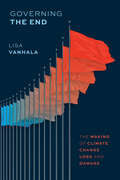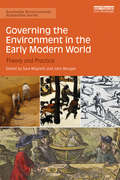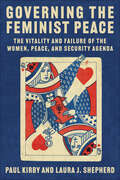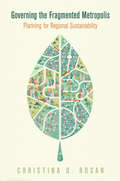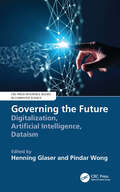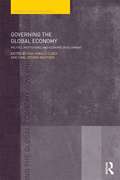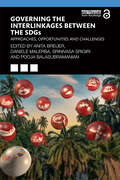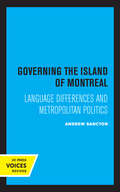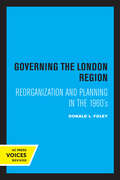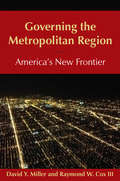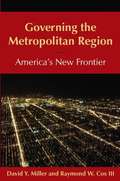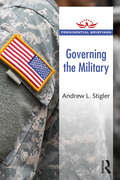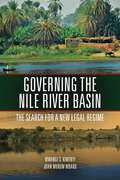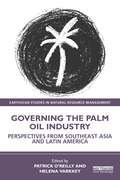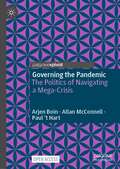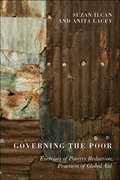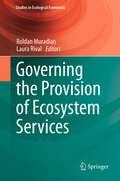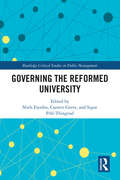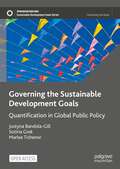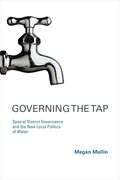- Table View
- List View
Governing the Dead: Martyrs, Memorials, and Necrocitizenship in Modern China
by Linh D. VuIn Governing the Dead, Linh D. Vu explains how the Chinese Nationalist regime consolidated control by honoring its millions of war dead, allowing China to emerge rapidly from the wreckage of the first half of the twentieth century to become a powerful state, supported by strong nationalistic sentiment and institutional infrastructure. The fall of the empire, internecine conflicts, foreign invasion, and war-related disasters claimed twenty to thirty million Chinese lives. Vu draws on government records, newspapers, and petition letters from mourning families to analyze how the Nationalist regime's commemoration of the dead and compensation of the bereaved actually fortified its central authority. By enshrining the victims of violence as national ancestors, the Republic of China connected citizenship to the idea of the nation, promoting loyalty to the "imagined community." The regime constructed China's first public military cemetery and hundreds of martyrs' shrines, collectively mourned millions of fallen soldiers and civilians, and disbursed millions of yuan to tens of thousands of widows and orphans. The regime thus exerted control over the living by creating the state apparatus necessary to manage the dead. Although the Communist forces prevailed in 1949, the Nationalists had already laid the foundation for the modern nation-state through their governance of dead citizens. The Nationalist policies of glorifying and compensating the loyal dead in an age of catastrophic destruction left an important legacy: violence came to be celebrated rather than lamented.
Governing the Displaced: Race and Ambivalence in Global Capitalism
by Ali BhagatGoverning the Displaced answers a straightforward question: how are refugees governed under capitalism in this moment of heightened global displacement? To answer this question, Ali Bhagat takes a dual case study approach to explore three dimensions of refugee survival in Paris and Nairobi: shelter, work, and political belonging. Bhagat's book makes sense of a global refugee regime along the contradictory fault lines of passive humanitarianism, violent exclusion, and organized abandonment in the European Union and East Africa. Governing the Displaced highlights the interrelated and overlapping features of refugee governance and survival in these seemingly disparate places. In its intersectional engagement with theories of racial capitalism with respect to right-wing populism, labor politics, and the everyday forms of exclusion, the book is a timely and necessary contribution to the field of migration studies and to political economy.
Governing the Economy: The Politics of State Intervention in Britain and France (Europe And The International Order Ser.)
by Peter A. HallFor over one hundred years, the British economy has been in decline relative to other industrialized countries. <p><p>This book explores the origins of Britain's economic problems and develops a striking new argument about the sources of decline. It goes on to analyze the evolution of economic policy in postwar Britain from the development of Keynesianism to the rise of monetarism under Margaret Thatcher. France, by contrast, experienced an economic miracle in the postwar period. <p><p>Hall argues that the French state transformed itself and then its society through an extensive system of state intervention. In the recent period, however, the French system has encountered many difficulties, and the book locates their sources in the complex interaction between state and society in France culminating in the socialist experiment of Francois Mitterrand. <p><p>Through his insightful, comparative examination of policy-making in Britain and France, Hall develops a new approach to state-society relations that emphasizes the crucial role of institutional structures.
Governing the End: The Making of Climate Change Loss and Damage (Chicago Series in Law and Society)
by Lisa VanhalaA searing account of how the international community is trying—and failing—to address the worst effects of climate change and the differential burdens borne by rich and poor countries. Climate change is increasingly accepted as a global emergency creating irrevocable losses for the planet. Yet, each country experiences these losses differently, and reaching even inadequate political agreements is fraught with contestation. Governing the End untangles the complex relationship between deteriorating environmental conditions, high politics, and everyday diplomatic practices, focusing on the United Nations’ agreement to address “loss and damage” and subsequent battles over implementation. Lisa Vanhala looks at the differing assumptions and strategic framings that poor and rich countries bring to bear and asks why some norms emerge and diffuse while others fail to do so. Governing the End is based on ethnographic observation of eight years of UN meetings and negotiations and more than one hundred and fifty interviews with diplomats, policymakers, UN secretariat staff, experts, and activists. It explores explicit political contestation, as well as the more clandestine politics that have stymied implementation and substantially reduced the scope of compensation to poor countries. In doing so, Governing the End elucidates the successes and failures of international climate governance, revealing the importance of how ideas are constructed and then institutionally embodied.
Governing the Environment in the Early Modern World: Theory and Practice (Routledge Environmental Humanities)
by John Morgan Sara MigliettiThroughout the early modern period, scientific debate and governmental action became increasingly preoccupied with the environment, generating discussion across Europe and the wider world as to how to improve land and climate for human benefit. This discourse eventually promoted the reconsideration of long-held beliefs about the role of climate in upholding the social order, driving economies and affecting public health. Governing the Environment in the Early Modern World explores the relationship between cultural perceptions of the environment and practical attempts at environmental regulation and change between 1500 and 1800. Taking a cultural and intellectual approach to early modern environmental governance, this edited collection combines an interpretative perspective with new insights into a period largely unfamiliar to environmental historians. Using a rich and multifaceted narrative, this book offers an understanding as to how efforts to enhance productive aspects of the environment were both led by and contributed to new conceptualisations of the role of ‘nature’ in human society. This book offers a cultural and intellectual approach to early modern environmental history and will be of special interest to environmental, cultural and intellectual historians, as well as anyone with an interest in the culture and politics of environmental governance.
Governing the Feminist Peace: The Vitality and Failure of the Women, Peace, and Security Agenda (Columbia Studies in International Order and Politics)
by Laura Shepherd Paul C. KirbyThe Women, Peace, and Security (WPS) agenda is celebrated as a landmark global framework for achieving gender equality in peace and security governance. Its power is visible in two decades of United Nations resolutions, national action plans, regional initiatives, and countless activist, academic, and philanthropic projects. Yet despite this vitality, it is haunted by failure, as a lack of political will and stubborn patriarchal resistance frustrate its promise.This book offers a groundbreaking critical account of the WPS agenda, exploring its evolution in relation to the wider politics of global governance and feminism. Paul Kirby and Laura J. Shepherd argue that WPS is not a settled, cohesive policy but a field in flux, defined and disrupted by a growing number of national, supranational, subnational, and transnational agents who in turn act on an expanding catalogue of threats, from climate change to homophobia, challenging traditional boundaries of peace and security. Kirby and Shepherd reconceptualize WPS as a “policy ecosystem,” tracing interaction and contestation around the agenda across levels from the UN Security Council to military alliances to feminist activists. They combine analysis of a vast dataset of policy documents with key informant interviews and close readings of diplomacy, statecraft, the politics of indigeneity, counterinsurgency, antimilitarism, human rights, and the arms trade across the first twenty years of WPS. Far-reaching and incisive, Governing the Feminist Peace poses a provocative question: What if we abandoned the idea of the WPS agenda as a unified political project altogether?
Governing the Fragmented Metropolis: Planning for Regional Sustainability (The City in the Twenty-First Century)
by Christina D. RosanToday the challenges facing our nation's metropolitan regions are enormous: demographic change, aging infrastructure, climate change mitigation and adaptation, urban sprawl, spatial segregation, gentrification, education, housing affordability, regional equity, and more. Unfortunately, local governments do not have the capacity to respond to the interlocking set of problems facing metropolitan regions, and future challenges such as population growth and climate change will not make it easier. But will we ever have a more effective and sustainable approach to developing the metropolitan region? The answer may depend on our ability to develop a means to govern a metropolitan region that promotes population density, regional public transit systems, and the equitable development of city and suburbs within a system of land use and planning that is by and large a local one. If we want to plan for sustainable regions we need to understand and strengthen existing metropolitan planning arrangements. Christina D. Rosan observes that policy-makers and scholars have long agreed that we need metropolitan governance, but they have debated the best approach. She argues that we need to have a more nuanced understanding of both metropolitan development and local land use planning. She interviews over ninety local and regional policy-makers in Portland, Denver, and Boston, and compares the uses of collaboration and authority in their varying metropolitan planning processes. At one end of the spectrum is Portland's approach, which leverages its authority and mandates local land use; at the other end is Boston's, which offers capacity building and financial incentives in the hopes of garnering voluntary cooperation. Rosan contends that most regions lie somewhere in between and only by understanding our current hybrid system of local land use planning and metropolitan governance will we be able to think critically about what political arrangements and tools are necessary to support the development of environmentally, economically, and socially sustainable metropolitan regions.
Governing the Future: Digitalization, Artificial Intelligence, Dataism (CRC Press Reference Books in Computer Science)
by Henning Glaser Pindar WongWe are living in times of deep and disruptive change. Perhaps the most powerful vector of this change can be described by three related catchphrases: digitalization, artificial intelligence, and dataism. Drawing on considerable expertise from a wide range of scholars and practitioners, this interdisciplinary collection addresses the challenges, impacts, opportunities and regulation of this civilizational transformation from a variety of angles, including technology, philosophy, cultural studies, international law, sociology and economics. This book will be of special interest to scholars, students, analysts, policy planners, and decision-makers in think tanks, international organizations, and state agencies studying and dealing with the development and governance of disruptive technologies.
Governing the Global Economy: Politics, Institutions and Economic Development (Routledge Studies in Globalisation)
by Dag Harald Claes Carl Henrik KnutsenGoverning the Global Economy explores the dynamic interaction between politics and economics, between states and markets and between international and domestic politics. The contributors study how the governance of the global economy is shaped by interaction between international institutions, domestic politics and multinational enterprises, from a wide range of theoretical perspectives and methods. Presenting a fresh approach to the study of international political economy, this volume covers: the systemic characteristics of the liberal world order, the role of international institutions, domestic economic politics and policies the strategies and behaviour of multinational enterprises. The volume also includes topical discussion of the challenges to the global economy from the recent financial crisis and analysis of economic politics, in particular the regions of Africa and Europe as well as the countries of Japan and South Korea. With contributions from prominent scholars in political science, economics and business studies, who have all contributed greatly to advancing the study of political economy over the last decade, Governing the Global Economy aims to bridge the gap between undergraduate textbooks and advanced theory. It is essential reading for all students and scholars of international political economy and globalization.
Governing the Interlinkages between the SDGs: Approaches, Opportunities and Challenges
by Anita Breuer Daniele Malerba Srinivasa Srigiri Pooja BalasubramanianGoverning the Interlinkages between the SDGs: Approaches, Opportunities and Challenges identifies the institutional processes, governance mechanisms and policy mixes that are conducive to devising strategies of integrated Sustainable Development Goal (SDG) implementation. The book edited by Anita Breuer, Daniele Malerba, Srinivasa Srigiri and Pooja Balasubramanian examines the dedicated policies targeting the SDGs, as well as political and institutional drivers of synergies and trade-offs between the SDGs in selected key areas – both cross-nationally and in specific country contexts. Their analysis moves beyond the focus on links between SDG indicators and targets. Instead, the book takes advantage of recent evidence from the initial implementation phase of the SDGs and each chapter explores the question of which political-institutional prerequisites, governance mechanisms and policy instruments are suited to accelerate the implementation of the SDGs. The findings presented are intended to both inform high-level policy debates and to provide orientation for practitioners working on development cooperation. This volume will be of great interest to practitioners and policy makers in the field of sustainable development, as well as academics in the fields of sustainability research, political science, and economics.
Governing the Island of Montreal: Language Differences and Metropolitan Politics (Lane Studies in Regional Government)
by Andrew SanctonLocated at the junction of the St. Lawrence and Ottawa rivers, Montreal Island is the main contact point between French and English Canadians. Prior to Quebec's "Quiet Revolution" of the 1960s, local governments in Montreal both reflected and perpetuated the mutual isolation of French and English. Residential concentration in autonomous suburbs, together with self-contained networks of schools and social services, enabled English-speaking Montrealers to control the city's economy and to conduct their community's affairs with little regard for the French-speaking majority. The modernization of the Quebec state in the 1960s dramatically challenged this arrangement. The author demonstrates how the English-speaking politicians in cooperation with certain French-speaking allies have succeeded in preventing the wholesale adoption of ambitious schemes for metropolitan reorganization. He describes the workings of a society divided by language and ethnicity, where the pervasiveness of the politics of language impedes all plans for comprehensive metropolitan reform. This title is part of UC Press's Voices Revived program, which commemorates University of California Press's mission to seek out and cultivate the brightest minds and give them voice, reach, and impact. Drawing on a backlist dating to 1893, Voices Revived makes high-quality, peer-reviewed scholarship accessible once again using print-on-demand technology. This title was originally published in 1985.
Governing the London Region: Reorganization and Planning in the 1960's
by Donald L. FoleyThis title is part of UC Press's Voices Revived program, which commemorates University of California Press’s mission to seek out and cultivate the brightest minds and give them voice, reach, and impact. Drawing on a backlist dating to 1893, Voices Revived makes high-quality, peer-reviewed scholarship accessible once again using print-on-demand technology. This title was originally published in 1972.
Governing the Market: Economic Theory and the Role of Government in East Asian Industrialization
by Robert WadePublished originally in 1990 to critical acclaim, Robert Wade's Governing the Market quickly established itself as a standard in contemporary political economy. In it, Wade challenged claims both of those who saw the East Asian story as a vindication of free market principles and of those who attributed the success of Taiwan and other countries to government intervention. Instead, Wade turned attention to the way allocation decisions were divided between markets and public administration and the synergy between them. <p><p>Now, in a new introduction to this paperback edition, Wade reviews the debate about industrial policy in East and Southeast Asia and chronicles the changing fortunes of these economies over the 1990s. He extends the original argument to explain the boom of the first half of the decade and the crash of the second, stressing the links between corporations, banks, governments, international capital markets, and the International Monetary Fund. From this, Wade goes on to outline a new agenda for national and international development policy.
Governing the Metropolitan Region: America's New Frontier
by David Y Miller Raymond CoxThis text is aimed at the basic local government management course (upper division or graduate) that addresses the structural, political and management issues associated with regional and metropolitan government. It also can complement more specialized courses such as urban planning, urban government, state and local politics, and intergovernmental relations.
Governing the Metropolitan Region: America's New Frontier
by David Y. Miller Raymond W. Iii CoxGoverning the Metropolitan Region: America's New Frontier is a new, up-to-date text for the basic local government management course (upper division or graduate) that addresses the structural, political and management issues associated with regional and metropolitan government. It also can complement more specialized courses such as urban planning, urban government, state and local politics, and intergovernmental relations. Key features:--More current than other available books on the subject. --Introduces the key concept of the urban core as the basis for governance of the overall metropolitan area. --The first book to stress the interconnectedness of intergovernmental relations and state-local politics for political scientists, the political sociology of community for the urban planners, and governance as both a political and management issue for those in public administration. --Exceptional coverage of fiscal issues and intergovernmental relationships. Governing the Metropolitan Region: America's New Frontier is supported with extensive charts and graphs, summary Things to Ponder sections to spark further thought and discussion, and an extensive bibliography.
Governing the Military (Presidential Briefings Series)
by Andrew L. StiglerA military is the most significant tool of a nation’s foreign policy, and (hopefully) the tool of last resort. Yet the control a civilian leader has over the military is, in many respects, an encumbered and fractured control. The military’s organizational culture, role in society, size, and considerable autonomy are potential obstacles to true civilian control over the military even in peacetime. A brief but historically informed text intended for students of the presidency or national security, Governing the Military addresses the gamut of challenges a new U.S. President faces as commander-in-chief.
Governing the Nile River Basin
by John Mbaku Mwangi KimenyiThe effective and efficient management of water is a major problem, not just for economic growth and development in the Nile River basin, but also for the peaceful coexistence of the millions of people who live in the region. Of critical importance to the people of this part of Africa is the reasonable, equitable and sustainable management of the waters of the Nile River and its tributaries.Written by scholars trained in economics and law, and with significant experience in African political economy, this book explores new ways to deal with conflict over the allocation of the waters of the Nile River and its tributaries. The monograph provides policymakers in the Nile River riparian states and other stakeholders with practical and effective policy options for dealing with what has become a very contentious problem--the effective management of the waters of the Nile River. The analysis is quite rigorous but also extremely accessible.
Governing the Nile River Basin
by John Mbaku Mwangi KimenyiThe effective and efficient management of water is a major problem, not just for economic growth and development in the Nile River basin, but also for the peaceful coexistence of the millions of people who live in the region. Of critical importance to the people of this part of Africa is the reasonable, equitable and sustainable management of the waters of the Nile River and its tributaries.Written by scholars trained in economics and law, and with significant experience in African political economy, this book explores new ways to deal with conflict over the allocation of the waters of the Nile River and its tributaries. The monograph provides policymakers in the Nile River riparian states and other stakeholders with practical and effective policy options for dealing with what has become a very contentious problem-the effective management of the waters of the Nile River. The analysis is quite rigorous but also extremely accessible.
Governing the Palm Oil Industry: Perspectives from Southeast Asia and Latin America (ISSN)
by Helena Varkkey Patrick O’ReillyThis book examines how different countries across Southeast Asia and Latin America respond to the emergence and expansion of the lucrative, yet controversial palm oil industry, paying attention to how national policy and governance regimes are shaping this global industry.With its historic roots in Southeast Asia, oil palm cultivation continues to expand beyond its historical centres. In Latin America, many countries are now developing their own policies to promote and govern oil palm cultivation. This book provides a unique examination of how different countries strive to strike a balance between developmental and environmental concerns, through case studies on Indonesia, Malaysia, the Philippines, Thailand, Colombia, Brazil, Ecuador, Honduras, and Mexico, and an outlook for the industry's prospects in Africa. This book applies an assemblage approach to draw out lessons on the global challenges posed by the industry and how differing national governance regimes and communities might respond to them. Rather than a single global industry, the book unveils a complex arrangement of national and even local palm oil assemblages, indicating that there is more than one way to do palm oil. In doing so, the book contributes to a better understanding of the drivers and processes that shape the governance of the industry, both in different nations and globally.This book will be of great interest to students and scholars of the palm oil industry, as well as those interested in natural resource governance, sustainable agriculture, conservation, environmental justice, and environmental and development policy more broadly.
Governing the Pandemic: The Politics of Navigating a Mega-Crisis
by Arjen Boin Allan McConnell Paul 't HartThis open access book offers unique insights into how governments and governing systems, particularly in advanced economies, have responded to the immense challenges of managing the coronavirus pandemic and the ensuing disease COVID-19. Written by three eminent scholars in the field of the politics and policy of crisis management, it offers a unique ‘bird’s eye’ view of the immense logistical and political challenges of addressing a worst-case scenario that would prove the ultimate stress test for societies, governments, governing institutions and political leaders. It examines how governments and governing systems have (i) made sense of emerging transboundary threats that have spilled across health, economic, political and social systems (ii) mobilised systems of governance and often fearful and sceptical citizens (iii) crafted narratives amid high uncertainty about the virus and its impact and (iv) are working towards closure and a return to ‘normal’ when things can never quite be the same again. The book also offers the building blocks of pathways to future resilience. Succeeding and failing in all these realms is tied in with governance structures, experts, trust, leadership capabilities and political ideologies. The book appeals to anyone seeking to understand ‘what’s going on?’, but particularly academics and students across multiple disciplines, journalists, public officials, politicians, non-governmental organisations and citizen groups.
Governing the Poor
by Anita Lacey Suzan IlcanEvery day, we are barraged by statistics, images, and emotional messages that present poverty as a problem to be quantified, managed, and solved. Global generations present the poor as a heterogeneous group and stress globalized solutions to the problem of poverty. Governing the Poor exposes the ways in which such generalized descriptions and quantifications marginalize the poor and their experiences.
Governing the Provision of Ecosystem Services
by Roldan Muradian Laura RivalFounded on the core notion that we have reached a turning point in the governance, and thus the conservation, of ecosystems and the environment, this edited volume features more than 20 original chapters, each informed by the paradigm shift in the sector over the last decade. Where once the emphasis was on strategies for conservation, enacted through instruments of control such as planning and 'polluter pays' legislation, more recent developments have shown a shift towards incentive-based arrangements aimed at those responsible for providing the environmental services enabled by such ecosystems. Encouraging shared responsibility for watershed management, developed in Costa Rica, is a prime example, and the various interests involved in its instauration in Java are one of the subjects examined here.
Governing the Reformed University (Routledge Critical Studies in Public Management)
by Carsten Greve Niels Ejersbo Signe Pihl-ThingvadUniversities are important public institutions and are seen as key drivers for a country’s economic and intellectual development. Their ability to deliver relevant research and education at the highest level have an impact on growth and progress in society, and governments attempt to control and govern the development of the universities. It is no longer left to the individual researcher or the institution to determine the role of the university. Universities have traditionally had a special role in society with a high degree of autonomy and independence. They have been described as a self-governing Republic of Science and their internal organization is characterized as "academic tribes". However, universities can also be viewed as institutions with somewhat similar characteristics as other public institutions with highly professionalized staff. Governing the Reformed University is a coherent volume based on a unique data set. The aim of the book is to quantitatively and qualitatively understand and explain how reforms and management instruments are implemented and how it influences different levels of the organization from the top management level to the employees within universities. It contributes to the knowledge of reform and reform impact in higher education. It also adds to our understanding of management and governance at universities and through which mechanisms management works at universities. This book builds on and adds to the knowledge of studies of reform and governance at universities. The data used in the book consists of a number of data sets and is collected as part of a comprehensive research project. Academics and policy makers alike in the fields of public administration, public management, public policy, educational studies and accountancy will find this of high interest.
Governing the Sustainable Development Goals: Quantification in Global Public Policy (Sustainable Development Goals Series)
by Sotiria Grek Justyna Bandola-Gill Marlee TichenorThis open access book conceptualises the Sustainable Development Goals as epistemic infrastructures that connect numbers, networks and governing paradigms.The book approaches quantification not merely as a tool for governing, but rather as a broader epistemic system through which global public policy is produced. This book focuses on the role of international organisations in shaping and implementing the 2030 Agenda and demonstrates how the SDGs have transformed and accelerated trends in quantification.
Governing the Tap: Special District Governance and the New Local Politics of Water (American and Comparative Environmental Policy)
by Megan MullinAn analysis of the political consequences of special district governance in drinking water management that offers new insights into the influence of political structures on local policymaking.More than ever, Americans rely on independent special districts to provide public services. The special district—which can be as small as a low-budget mosquito abatement district or as vast as the Port Authority of New York and New Jersey—has become the most common form of local governance in the United States. In Governing the Tap, Megan Mullin examines the consequences of specialization and the fragmentation of policymaking authority through the lens of local drinking-water policy. Directly comparing specific conservation, land use, and contracting policies enacted by different forms of local government, Mullin investigates the capacity of special districts to engage in responsive and collaborative decision making that promotes sustainable use of water resources. She concludes that the effect of specialization is conditional on the structure of institutions and the severity of the policy problem, with specialization offering the most benefit on policy problems that are least severe. Mullin presents a political theory of specialized governance that is relevant to any of the variety of functions special districts perform. Governing the Tap offers not only the first study of how the new decentralized politics of water is taking shape in American communities, but also new and important findings about the influence of institutional structures on local policymaking.
